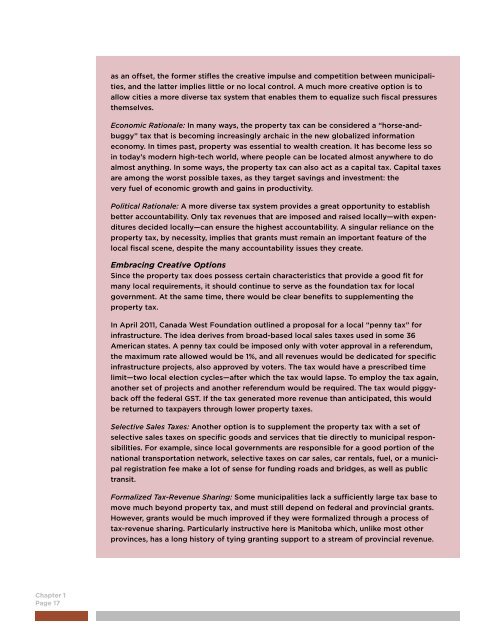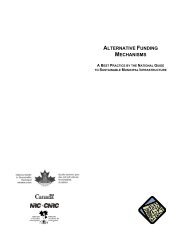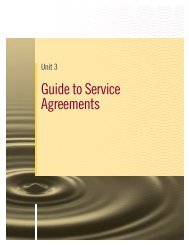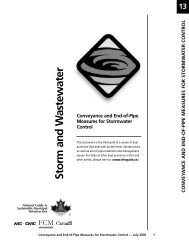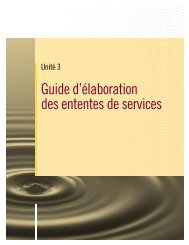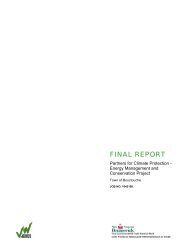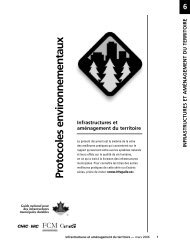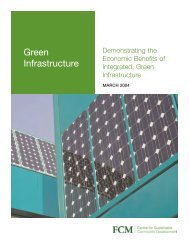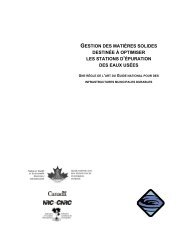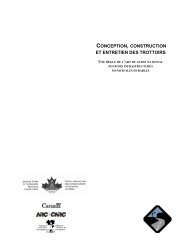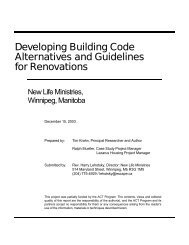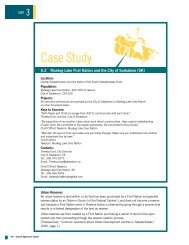The State of Canada's Cities and Communities 2012 - FCM
The State of Canada's Cities and Communities 2012 - FCM
The State of Canada's Cities and Communities 2012 - FCM
Create successful ePaper yourself
Turn your PDF publications into a flip-book with our unique Google optimized e-Paper software.
Chapter 1<br />
Page 17<br />
as an <strong>of</strong>fset, the former stifles the creative impulse <strong>and</strong> competition between municipalities,<br />
<strong>and</strong> the latter implies little or no local control. A much more creative option is to<br />
allow cities a more diverse tax system that enables them to equalize such fiscal pressures<br />
themselves.<br />
Economic Rationale: In many ways, the property tax can be considered a “horse-<strong>and</strong>-<br />
buggy” tax that is becoming increasingly archaic in the new globalized information<br />
economy. In times past, property was essential to wealth creation. It has become less so<br />
in today’s modern high-tech world, where people can be located almost anywhere to do<br />
almost anything. In some ways, the property tax can also act as a capital tax. Capital taxes<br />
are among the worst possible taxes, as they target savings <strong>and</strong> investment: the<br />
very fuel <strong>of</strong> economic growth <strong>and</strong> gains in productivity.<br />
Political Rationale: A more diverse tax system provides a great opportunity to establish<br />
better accountability. Only tax revenues that are imposed <strong>and</strong> raised locally—with expenditures<br />
decided locally—can ensure the highest accountability. A singular reliance on the<br />
property tax, by necessity, implies that grants must remain an important feature <strong>of</strong> the<br />
local fiscal scene, despite the many accountability issues they create.<br />
Embracing Creative Options<br />
Since the property tax does possess certain characteristics that provide a good fit for<br />
many local requirements, it should continue to serve as the foundation tax for local<br />
government. At the same time, there would be clear benefits to supplementing the<br />
property tax.<br />
In April 2011, Canada West Foundation outlined a proposal for a local “penny tax” for<br />
infrastructure. <strong>The</strong> idea derives from broad-based local sales taxes used in some 36<br />
American states. A penny tax could be imposed only with voter approval in a referendum,<br />
the maximum rate allowed would be 1%, <strong>and</strong> all revenues would be dedicated for specific<br />
infrastructure projects, also approved by voters. <strong>The</strong> tax would have a prescribed time<br />
limit—two local election cycles—after which the tax would lapse. To employ the tax again,<br />
another set <strong>of</strong> projects <strong>and</strong> another referendum would be required. <strong>The</strong> tax would piggyback<br />
<strong>of</strong>f the federal GST. If the tax generated more revenue than anticipated, this would<br />
be returned to taxpayers through lower property taxes.<br />
Selective Sales Taxes: Another option is to supplement the property tax with a set <strong>of</strong><br />
selective sales taxes on specific goods <strong>and</strong> services that tie directly to municipal responsibilities.<br />
For example, since local governments are responsible for a good portion <strong>of</strong> the<br />
national transportation network, selective taxes on car sales, car rentals, fuel, or a municipal<br />
registration fee make a lot <strong>of</strong> sense for funding roads <strong>and</strong> bridges, as well as public<br />
transit.<br />
Formalized Tax-Revenue Sharing: Some municipalities lack a sufficiently large tax base to<br />
move much beyond property tax, <strong>and</strong> must still depend on federal <strong>and</strong> provincial grants.<br />
However, grants would be much improved if they were formalized through a process <strong>of</strong><br />
tax-revenue sharing. Particularly instructive here is Manitoba which, unlike most other<br />
provinces, has a long history <strong>of</strong> tying granting support to a stream <strong>of</strong> provincial revenue.


